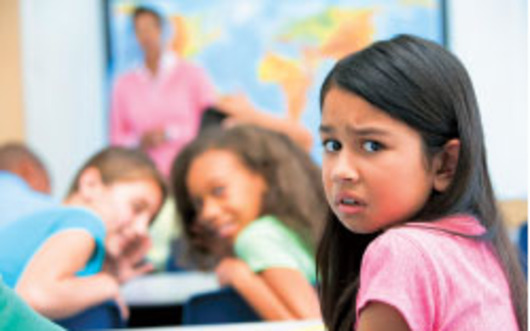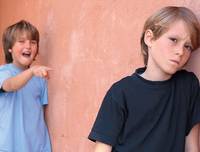How to Handle Trouble at School

All of us have been teased at some point in our lives, especially while growing up. Sometimes it’s light-hearted joking between friends or family members. But other times, teasing escalates into something much more sinister and damaging: bullying.
According to the website www.Bullying.org, in Canada, bullying happens every seven minutes on the playground. Bullies can find any reason to target someone – maybe because he or she wears glasses, is overweight or wears hand-me-downs. Children with disabilities are frequently singled out for being different. They may speak differently, walk differently, use assistive devices or have difficulty with social interaction – all of which bullies can turn into jokes.
It happened to me. While growing up in Kitchener, Ont., I was tormented because I stuttered (something that I still struggle with) and required special education for math and language arts. I was also made fun of because I repeated Grade 6.
Being bullied or teased has a profound effect on a child’s self-esteem; it hurts, you feel alone, and it is humiliating. Victims often feel it is their fault or that they deserve it. I had those feelings from time to time. I’ll always remember the pain I felt upon hearing nasty comments and laughter at school when I was in Grade 6 and other kids my age were in Grade 7.
Like many children who are teased in school, I became shy and kept my sadness to myself, pretending everything was just hunky dory. Fortunately, I had a wonderful teacher in Grades 5 and 8, Phil Grominsky, who knew the sensitivity of a child’s feelings, and endeavoured to keep children of different abilities in the same class.
Grominsky is now retired. I contacted him to find out why he hadn’t sent me off to a special education class. “I believe that it’s best to keep children in the classroom as much as possible. It helps with their self-esteem, which promotes a better learning attitude,” he says. “It also showed the rest of the class that we work together as a community.”
Thanks to him, I stayed in the classroom, doing assignments at a level that I could handle and working alongside my peers, which was somewhat unusual at the time. These days, more teachers are working to promote inclusion and acceptance at school. Nevertheless, kids with disabilities are more likely to be bullied or teased
than kids without disabilities.
Lisa Bendall is the author of Raising a Kid with Special Needs: The Complete Canadian Guide (Key Porter Books) and the former managing editor of Abilities. Her book offers advice about bullying, an issue that she says parents should be vigilant about. “On one hand, there is more awareness of disability in classrooms than there used to be, which probably means that kids are more sensitive to these types of differences and less likely to bully,” says Bendall. “On the other hand, with more integration in schools than there used to be, kids with disabilities may be more exposed to potential bullies than previously. Schools these days are typically short on resources when it comes to supporting kids with disabilities in the classroom, and I would think this has an impact as well.”
Educating students and parents can make classrooms more supportive and minimize bullying. It can also encourage all students to focus on being friends, celebrate each other’s differences, and create a safe learning environment.
This was author Janet Ruth Heller’s goal for her children’s book How The Moon Regained Her Shape (Sylvan Dell Publishing), a story about bullying and self-confidence that was influenced by Native American folktales. After the sun bullies the moon, the moon is so upset that she shrinks until she is nearly invisible. With the help of the moon’s friends in the sky and on earth, the moon gradually regains her happiness, her confidence and her full shape.

Heller herself was bullied for four years, beginning in kindergarten. Each day at recess, she was taunted with the words “You’re so skinny that I can see right through you.” Her saving grace came when her family moved to another area of town, and her new school seemed to know how to handle bullies. Now, Heller visits schools and libraries to talk about her experiences. Parents and teachers can use books like hers to open up a dialogue about bullying with their students.
“As a child, I did not tell other people about the bullying that I suffered,” says Heller. “Now I know that this is not a good strategy. I want kids to tell their friends and to tell adults about the harassment until someone helps them. I also want children to know that a bully’s mean words are not true, and just because one person dislikes us, this does not mean that everyone hates us. We need to remember our friends and family members who care about us and see us as good people.”
Another great way to educate young students is through the power of music. Children’s entertainer Erick Traplin has teamed up with storyteller Dorothy Bowman to present educational concerts across Ontario. “Bullies and Heroes” is a 50-minute presentation that gives children strategies to handle bullying situations.
“Bullying is a complex subject, and in order to have any kind of long-lasting salutary effect on it, it takes the whole community – parents, teachers, social groups, etc. – to work toward eradicating it,” says Traplin. “Our concert plays a small part in this, and hopefully one of our songs will strike a chord with someone and make them stop and think before they act unkind, or give someone a tool to avoid being bullied.”
I wish “Bullies and Heroes” had been around when I was young! Perhaps things would have been different. I wonder if John Marks, the songwriter who wrote“Rudolph the Red-Nosed Reindeer” in the1940s, realized the impact his song would make. I identified with this beloved Christmas character, whose peers laugh at him for being different, but later realize that his difference is a strength. Neil Diamond’s version of the song is my favourite (sorry, Gene Autry), because he says: “Just you remember, kids out there, if kids laugh at you just because you’re a little different, you could be just like Rudolph – a hero someday, an inspiration.”
Melissa Martz is a childcare provider and writer who lives in Kitchener, Ont. She wrote “Singing the Praises of Music Therapy” for Abilities’ Spring 2008 issue.














